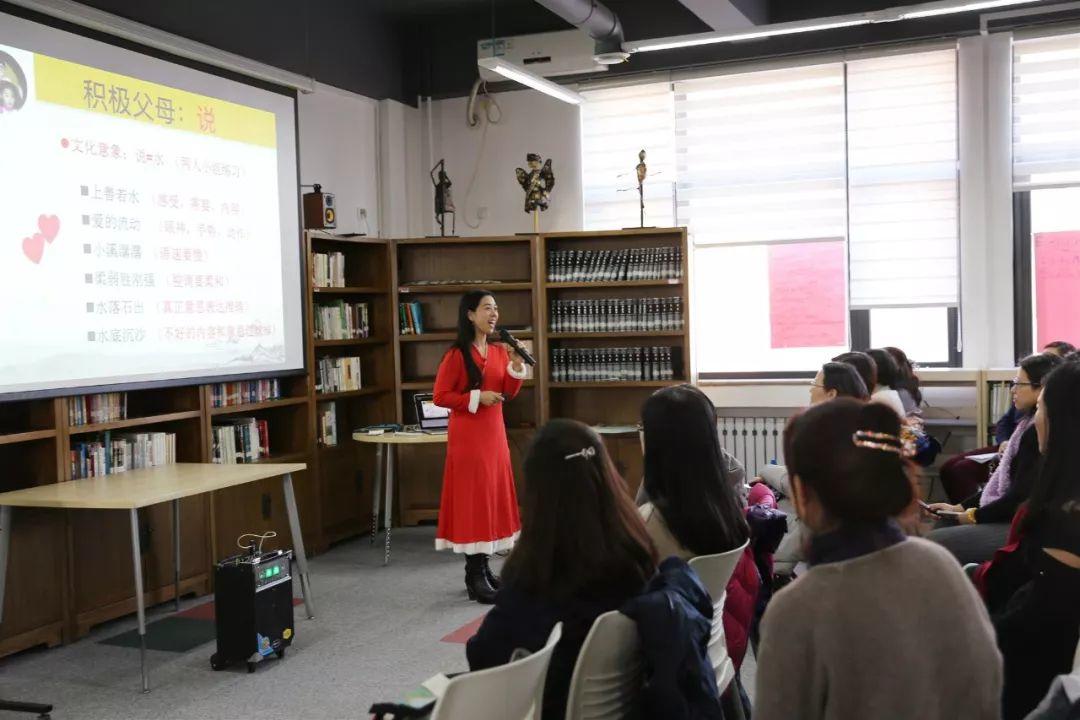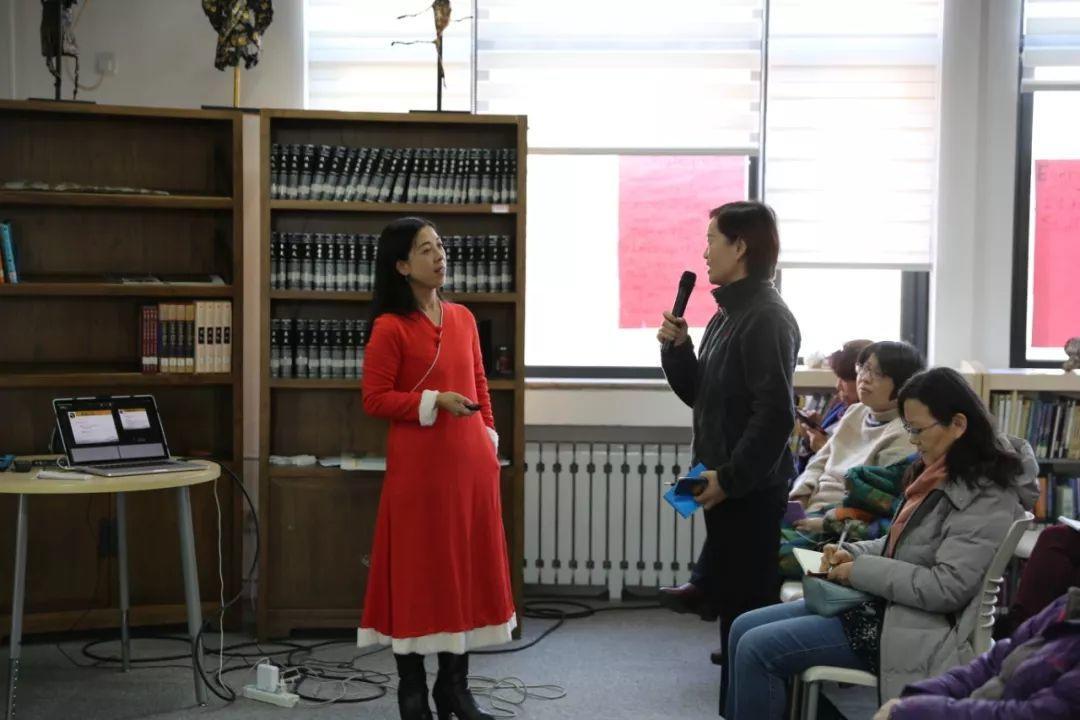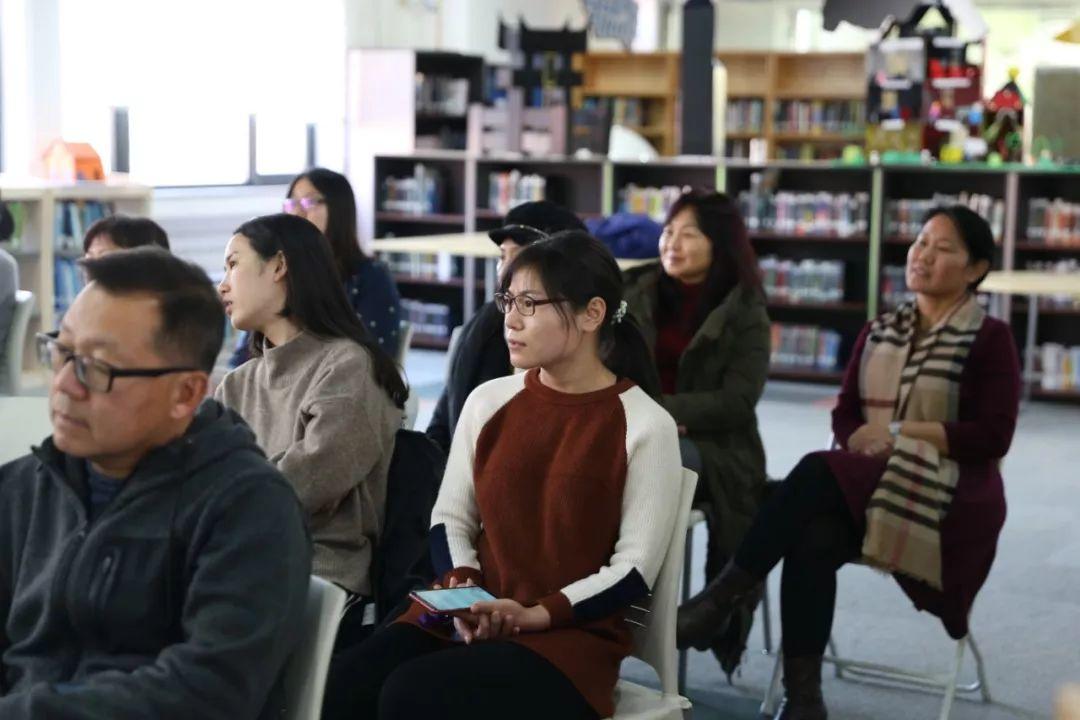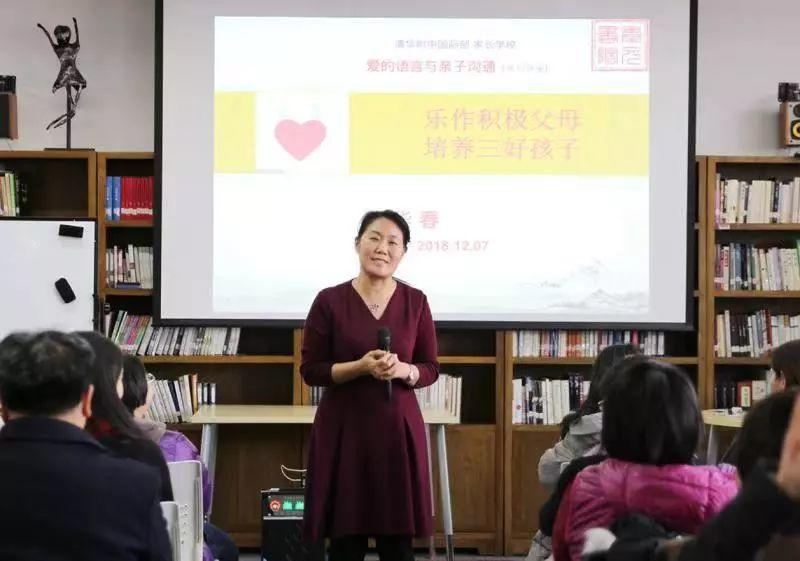冬日温情絮语 呵护凌云乔木——记清华附中国际部家长学校第九期讲座
“绿茗伴书香,红裙展雅韵。侧耳闻珠玑,渐悟沟通意。”这样充满诗情画意的图卷,在清华附中国际部图书馆里徐徐展开,这便是温暖如春的家长学校第九期讲座的会场。12月7日,董博士为50余位附中及国际部的家长,带来了“乐做积极父母,培养三好孩子”的讲座。December 7th, cold winter has arrived in Beijing. Outside the window the north wind is blowing white sky, inside the library of THIS, is the warm venue of the Parents School of the ninth lecture. Dr. Dong gave a lecture titled “Happy to be a positive parent, cultivate excellent children" to more than 50 parents.
本期讲座也是”爱的语言与亲子沟通”系列讲座的第三期。在前两期的讲座中,董华春博士和张然老师为家长们介绍了“非暴力沟通”和“正面管教”的理念和方法,通过课堂体验和生活中的运用,家长们改善了亲子关系,也提升了沟通技巧。在系列讲座的第三期,董华春博士将继续采用体验式教学的方法,引领家长们一起探寻成为积极父母之路。
This lecture is the third of the "Love language and parent-child communication" lecture series. In the last two lectures, Dr. Huachun Dong and Ms. Ran Zhang introduced the concepts and methods of "Non-Violent Communication" and "Positive Discipline" to parents. Through classroom experience and application in life, parents have improved their parent-child relationships and communication skills. In the third lecture, Dr. Dong will continue to use experiential teaching methods to lead parents in exploring ways to become active parents.

董博士提出,孩子的教育不仅仅在学校,而是在家庭,在父母,在他接触的每一个人。教育分有几个层次,包括知识教育、能力教育、智慧教育和心灵教育,其中,心灵教育是最重要也是最关键的一环。我们身为父母要学习的是如何塑造孩子积极、有生命力的心灵。
Dr. Dong suggests that a child's education is not only at school, but in the family, with the parents and everyone around them. Education is divided into several levels, such as knowledge education, ability education, wisdom education and mind education, and the mind education is the most important part. As parents, we need to learn how to help our children have a positive mindset.
首先,家长们要秉持“积极态度”。董博士列举了生活中常见的例子,启发家长们思考,为什么对待同一件事情,大家会有截然相反的看法呢?不同的生活态度,往往会影响我们对于世界的认知,也会影响到孩子的人生观,所以“乐做积极父母”的第一步,就是时常保持积极乐观的态度。
First, parents should adopt a "positive attitude". Dr. Dong lists some common examples in daily life, and helps parents to think about why people may adopt a negative rather than positive frame of mind. Different attitudes towards life often affect our perception of the world as well as children's outlook on life. Therefore, the first step of "being a positive parent" is to always maintain a positive and optimistic attitude.
其次,要学会使用“积极方法”。具体的步骤分为听、想、说、做、学。
Second, learn to use the "positive approach". Specific steps are divided into listening, thinking, speaking, doing and learning.
第一步——“听”,是亲子沟通的基础。据相关研究,在听的过程中,人类60%的语言内容、90%的情绪感受以及99%的心理需要都被漏掉了,我们一般只听到了40%的内容,10%的情绪感受以及1%的需要。
Step 1-- “listening”. Listening is the basis of parent-child communication. According to studies, in the process of listening, 60% of the language content, 90% of the emotional feelings and 99% of the psychological needs of human beings are missed. We generally only hear 40% of the content, 10% of the emotional feelings and 1% of the needs.
所以家长在听孩子讲话时,要刻意地训练自己,在听内容的时候,也去感受孩子的感受和孩子内心的需要。
So, parents should train themselves deliberately when listening to their children and try to empathize with their children's feelings.
第二步——“想”,在充分听的基础上,家长不必急着发表意见,保持情绪的稳定,开口之前要想一想,这件事正面优势1、2、3和负面劣势1、2、3,即所谓“三思而后说”。
Step 2 -- "thinking". Think before you speak. Parents should maintain emotional stability and do not need to express their opinions in haste. Before opening their mouths, they should think about the positive advantages 1, 2, 3 and negative disadvantages 1, 2 and 3 of taking action.
第三步——“说”,家长在说之前要与孩子先“共情”,认同其感受、肯定其需要,启发孩子“说出自己的感受”,通过商量解决问题,从而改善亲子之间的沟通。具体的技巧有:说的时候,家长要与孩子保持眼神的交流、合适的手势与动作,语速要慢、腔调要温柔,将真正的意思表达准确,并且将不好的内容和意思过滤掉。
Step 3 -- “speaking”. "Empathize" before speaking. Parents can improve parent-child communication through identifying children’s feelings and needs and then inviting them to "talk about their feelings". Specific techniques include maintaining eye contact with your child, using appropriate gestures and movements, speaking slowly and gently, expressing exactly what you want to say, and eliminating unnecessary negative words.
第四步——“做”,“十年树木,百年树人”,孩子的培育,像精心培育小树苗一样,需要系统的方法,漫长的过程,家人的团结协作等等。
Step 4 - “doing”. “It takes ten years to grow a tree, but a hundred to rear people”. The cultivation of children, as carefully as the cultivation of small saplings, needs a systematic approach, is a long process, and requires family unity and cooperation.
第五步——“学”,董博士强调“学生”的意义就是学习生活、学习生命的过程,保留孩子的内在热情,促进孩子的自发学习,经过渐进和积累,使孩子成长为乐于分享、有责任感的人。Step 5 -- "learning". Dr. Dong emphasizes that good parenting involves retaining the inner enthusiasm of children, promoting their children’s spontaneous learning, and helping their children grow into people who are willing to share and have a sense of responsibility.

家长们热情地参与了讲座中的两次活动教学,分别扮演“家长”和“孩子”,体验“听”和“说”两个环节,加深了理解。
Parents enthusiastically participated in two activities. One was role-playing parents and children respectively, and the other was experiencing the two parts of "listening" and "speaking", which deepened their understanding.
最后,董博士特别强调了沟通的重要性,希望家长们能将今天学到的“听”、“想”、“说”、“做”、“学”的五步法运用到生活当中去,像本杰明.富兰克林修炼十三项美德一样,逐项逐步地改进亲子沟通技巧,最后将孩子培育成“说好话”、“做好事”、“存好心”的三好孩子。
Finally, Dr. Dong placed special emphasis on the importance of communication using the five steps: “listening", "thinking", "speaking", "doing", "learning" will be used to gradually improve parent-child communication skills and help kids develop into excellent children.

当天,清华附中国际部副校长李文平女士也亲临现场并讲话。李校长指出家长学校就是要做一个社会、学校、家长沟通的桥梁,感谢家长们持续参与家长学校的学习,学习国际前沿的成功家庭教育方式,在系统学习中提升多方面综合素质,改善教育方法,提升教育水平,优化家庭的教育环境,增强教育效果,使每一个成员,都成为参与者、合作者和学习者;李校长也希望家长们把关注的焦点,从孩子的生活指向教育。从教育的角度解读我们的孩子,实现和孩子共同成长;更加希望家长们能够将学习到知识和理念运用于生活中,家校携手,共育英才,实现学校、家庭、社会三方面的教育合力,共同成长。
Today, the vice principal of THIS, Ms. Wenping Li gave a speech emphasizing that parents are the bridge between the society, schools and parents. She thanked the parents for continuing to learn about how to perfect family education, for improving their communication methods, and cultivating a positive atmosphere in their homes. Ms.Li also wanted parents to focus on their children's life education.

主讲人介绍Lecturer
董华春博士,香港大学访问学者,北京开放大学客座教授,清华大学博士后,北京大学国际金融法博士,美国宾夕法尼亚大学证券法博士。两个孩子(12岁和8岁)的妈妈,世界创新教育联盟中国委员会委员,美国正面管教家长讲师,曾系统学习美国正面管教、非暴力沟通、心理剧团体治疗、青春期亲子关系等课程。
Dr. Huachun Dong is a visiting scholar from Hong Kong University, a visiting professor at Beijing Open University, and has received a postdoctoral degree from Tsinghua University, a Doctor of International Financial Law at Peking University, and a Doctor of Securities law of Pennsylvania University, USA.
She is a mother of two children (ages 12 and 8) and a member of the China Committee of the World Alliance for Innovative Education. She is also a lecturer promoting Positive Discipline in the United States. She has systematically studied American Positive Discipline, Nonviolent Communication, psychodrama group therapy, adolescent parenthood and other courses.










